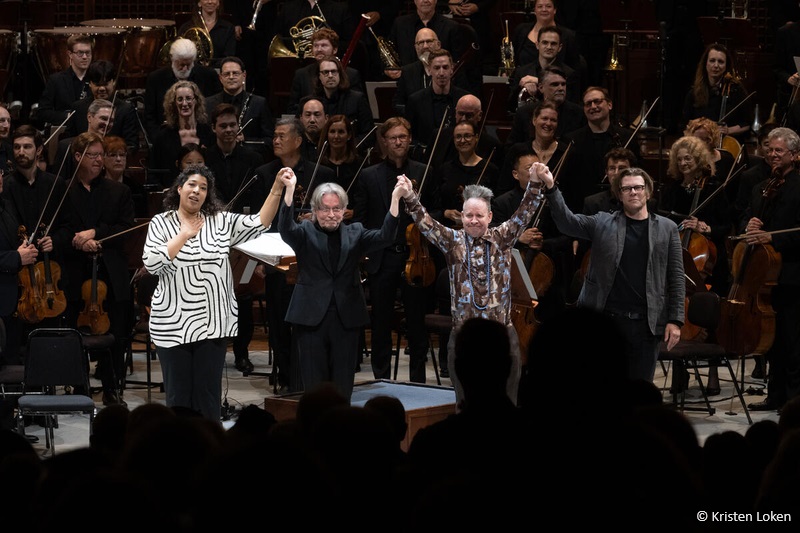
A MONODRAMA FOR SCENERY-CHEWING
Paying a generous end-of-season dividend, the San Francisco Symphony provided the patrons with a triple bill: Orchestra, a colossal vocal drama and a modern dance troupe, all compressed into a single program. And the vocal part unleashed the most exciting operatic voice heard all year, Mary Elizabeth Williams, acting out the Arnold Schoenberg monodrama “Erwartung” (Expectation) in passionate, semi-coherent detail.
Music director Esa-Pekka Salonen carried off this budget-busting cornucopia of musical treats in the last month of his penultimate season, even as his musicians were leafletting the patrons on arrival about the deficit-plagued orchestra’s belt-tightening moves. These not only led to the announced departure of Salonen but would also prevent such grand ventures in the future.
Clearly, all caution was thrown to the winds with the brilliant modernist Peter Sellars stage-directing “Erwartung” for the volcanic opera singer Williams, complete with lighting effects and a stage space with a body bag probably containing the cadaver of her lover. She may have been responsible for the latter’s death in her wobbly state of consciousness. The overwrought singer acts out her torments, nebulous frustrations and fears over a searing half-hour span. Written over a century ago, the half-hour work still packs a hysterical punch, bringing the whole Davies Hall audience to its knees in a unique way.
For the most passionate of roles, Williams seems ideally suited, even though her name and her origins in Philadelphia and Iowa would suggest heading in other directions than German romanticism. As an actress, she projects all the dimensions of insecurity, angst, despair and semi-coherent madness, throwing herself about stage, up and down. Vocally, her voice is a late-romantic volcano of fury, rendering the German poetry unerringly. Projections of English translations of the German were indispensable here.
The orchestra was pushed upstage, with conductor Salonen half-turned to enable looking at both orchestra and theatrics. The performance was off the charts.
This was a welcome broadening of the performance palette, as only the SFS can afford. It brought in other audiences in offering theater and dance, pairing the Schoenberg with the Alonzo King Ballet doing Ravel’s charming “Mother Goose” Suite of miniatures. King’s 11-member multi-racial modern ballet company never emulates Mother Goose’s Tom Thumb, “Beauty and the Beast” or Spinning Wheel. But King, a legend among Bay Area choreographers, finds the languid score a viable backdrop for his designs in movement, which blend ballet and toe shoes with modern dance via his robust, high-quality performers. Originally writing for concert settings, Ravel never introduced a fast-flying allegro segment showing off broader dimensions of dance.
But no two works, composed at the same time before World War One, ever reflected better the highly contrasting concurrent creativity in neighboring France and Germany: In Germany, with a broad brush; in France, with a deft pinsel.
MUSIC NOTES—Williams is a vocal rarity, singing roles in both the mezzo range (Erwartung) as well as soprano (Wagner’s Isolde)…. Joke of the weekend: Asking an usher, “Are there any staff psychiatrists on duty to help us overwrought patrons?”
SAN FRANCISCO SYMPHONY staging both Ravel’s ”Mother Goose Suite” with dancers of the Alonzo King Ballet, and the monodrama “Erwartung,” June 7-9. For SFS info: (415) 864-6000, or go online, www.sfsymphony.org.